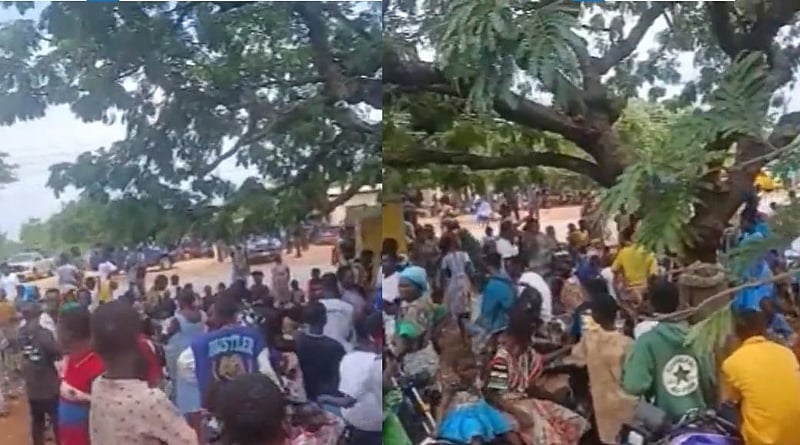The Gbiniyiri conflict, a land dispute in Ghana’s Savannah Region, has triggered a significant humanitarian crisis, displacing thousands of Ghanaians both internally and across international borders. Interior Minister Muntaka Mohammed-Mubarak confirmed that over 13,000 Ghanaians have sought refuge in neighboring Côte d’Ivoire, a figure corroborated by the Ivorian government. The Ghanaian government, in collaboration with the National Disaster Management Organisation (NADMO), is actively providing support to these displaced individuals and has expressed gratitude to the Ivorian government for their assistance in accommodating the refugees. This cross-border displacement underscores the severity of the conflict and the urgent need for a resolution to prevent further suffering and potential regional instability.
The government is pursuing peaceful resolution through dialogue and traditional authorities. The Peace Council has initiated a mediation process, with a delegation dispatched to meet with the Overlord of the Gonja Kingdom, Yagbonwura Bii-Kunuto Jewu Soale I, a highly respected figure in the region. The Minister expressed optimism about establishing a committee by the start of the following week to investigate the root causes of the conflict and formulate recommendations to prevent future occurrences. This committee’s work will be crucial in addressing the underlying land dispute and fostering long-term peace in the affected area. The government recognizes the urgency of resolving the conflict swiftly, not only for the immediate safety and well-being of the displaced but also to mitigate the potential for long-term food insecurity in the region, as many have abandoned their farms and livestock.
The internal displacement figures further highlight the widespread impact of the conflict. Fati Kine-Lam, the Bono Regional Director of NADMO, reported an additional 252 internally displaced persons (IDPs) in the Bono Region, adding to the already substantial number seeking refuge within Ghana. The majority of these IDPs are sheltering in the Wenchi Municipality, with smaller groups in other districts. The vulnerable condition of children and pregnant mothers among the displaced population underscores the urgent need for increased humanitarian assistance. The provision of adequate shelter, food, medical care, and psychosocial support is paramount to alleviate their suffering and prevent further health complications.
The Gbiniyiri conflict, stemming from a land dispute between two factions, has resulted in a devastating toll on human life and property. The reported death toll of approximately 31 individuals, coupled with the 48,000 displaced, paints a grim picture of the violence and its devastating consequences. Beyond the loss of life, the conflict has left many with gunshot wounds and witnessed the destruction of homes and properties, further exacerbating the humanitarian crisis. The scale of displacement and the associated humanitarian needs necessitate a coordinated response from government agencies, humanitarian organizations, and international partners to ensure that the affected populations receive the necessary support and assistance.
The government’s multi-pronged approach, involving both diplomatic efforts with Côte d’Ivoire and internal peace-building initiatives, demonstrates a commitment to resolving the conflict and addressing the humanitarian crisis. The engagement with traditional authorities, particularly the Yagbonwura, recognizes the importance of local leadership in fostering reconciliation and peacebuilding. The success of these efforts will be pivotal in ensuring the safe return of displaced persons, rebuilding communities, and preventing further violence. Furthermore, addressing the root causes of the conflict, including the underlying land dispute, is crucial for achieving sustainable peace and preventing future outbreaks of violence.
The international community also has a role to play in supporting Ghana’s efforts to address the Gbiniyiri crisis. Humanitarian organizations and international partners can provide critical assistance in meeting the immediate needs of the displaced populations, including shelter, food, medical care, and psychosocial support. Furthermore, international support for long-term development initiatives, such as land tenure reform and conflict resolution mechanisms, can contribute to building resilience and preventing future conflicts. Collaboration between the Ghanaian government, humanitarian actors, and international partners is essential for a comprehensive and effective response to the Gbiniyiri crisis and its multifaceted consequences.


